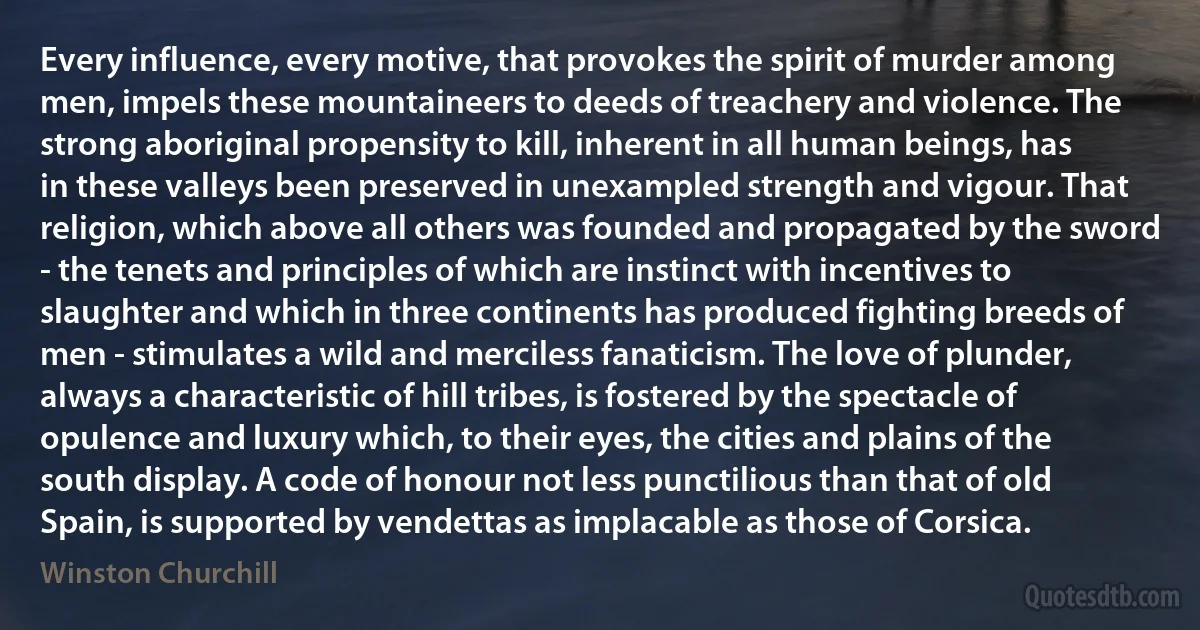
Every influence, every motive, that provokes the spirit of murder among men, impels these mountaineers to deeds of treachery and violence. The strong aboriginal propensity to kill, inherent in all human beings, has in these valleys been preserved in unexampled strength and vigour. That religion, which above all others was founded and propagated by the sword - the tenets and principles of which are instinct with incentives to slaughter and which in three continents has produced fighting breeds of men - stimulates a wild and merciless fanaticism. The love of plunder, always a characteristic of hill tribes, is fostered by the spectacle of opulence and luxury which, to their eyes, the cities and plains of the south display. A code of honour not less punctilious than that of old Spain, is supported by vendettas as implacable as those of Corsica.
Winston ChurchillRelated topics
above characteristic code fanaticism fighting hill human men kill less love opulence propensity religion slaughter spectacle spirit strength sword three treachery wild others honour deeds vigour eyesRelated quotes
Does Irish discontent arise because the priests of Maynooth are now insufficiently clad or fed? I have always thought that it arose because one-third of the people were paupers. I can easily see how, by the granting of this sum, you might hear far less in future times of the sufferings and wrongs of the people of Ireland than you have heard heretofore. For you find that one large means of influence possessed by those who have agitated for the redress of Irish wrongs is the support which the Irish Catholic clergy have given to the various associations for carrying on political agitation. And the object of this Bill is to tame down these agitators-it is a sop given to the priests. It is hush-money, given that they may not proclaim to the whole country, to Europe and to the world, the sufferings of the population to whom they administer the rites and the consolations of religion.

John Bright
And yet I will venture to believe that in no time, since the beginnings of Society, was the lot of those same dumb millions of toilers so entirely unbearable as it is even in the days now passing over us. It is not to die, or even to die of hunger, that makes a man wretched; many men have died; all men must die,-the last exit of us all is in a Fire-Chariot of Pain. But it is to live miserable we know not why; to work sore and yet gain nothing; to be heart-worn, weary, yet isolated, unrelated, girt in with a cold universal Laissez-faire: it is to die slowly all our life long, imprisoned in a deaf, dead, Infinite Injustice, as in the accursed iron belly of a Phalaris' Bull! This is and remains forever intolerable to all men whom God has made. Do we wonder at French Revolutions, Chartisms, Revolts of Three Days? The times, if we will consider them, are really unexampled.

Thomas Carlyle
We must call attention, among the workers parties or the extremist tendencies within those parties, to the need to undertake an effective ideological action in order to combat the emotional influence of advanced capitalist methods of propaganda. On every occasion, by every hyper-political means, we must publicize desirable alternatives to the spectacle of the capitalist way of life, so as to destroy the bourgeois idea of happiness. At the same time, taking into account the existence, within the various ruling classes, of elements that have always tended (out of boredom and thirst for novelty) toward things that lead to the disappearance of their societies, we should incite the persons who control some of the vast resources that we lack to provide us with the means to carry out our experiments, out of the same motives of potential profit as they do with scientific research.

Guy Debord
Take heed, therefore, wicked prelates, blind leaders of the blind; indurate and obstinate hypocrites, take heed .... Ye will be the chiefest in Christ's flock, and yet will not keep one jot of the right way of his doctrine ...ye keep thereof almost naught at all, but whatsoever soundeth to make of your bellies, to maintain your honour, whether in the Scripture, or in your own traditions, or in the pope's law, that ye compel the lay-people to observe; violently threatening them with your excommunications and curses, that they shall be damned, body and soul, if they keep them not. And if that help you not, then ye murder them mercilessly with the sword of the temporal powers, whom ye have made so blind that they be ready to slay whom ye command, and will not hear his cause examined, nor give him room to answer for himself.

William Tyndale
Towards the end of the twelfth century, while Western Europe was still wavering between a dying Roman influence and a dawning Gothicism, preliminaries to a medieval era which would make possible the development of a world-wide humanism, Asia had already lived through her classical period and, sinking into decay, was preparing to face a long period of political and spiritual unrest. While India was beginning to suffer under the yoke of the victorious Mussulman, who had come down on her from the mountains of Afghanistan and the plains of Iran, and while the domination of the Khmers was reaching its climax at Angkor, China, under pressure from the barbarians of the north, was withdrawing to the south where the Song empire, thinking itself safe from invasions, continued to live a life of luxury.

Louis Frédéric
